Understanding Anxiety and Distress in Times of Climate Change
‘Severe heat wave sweeps India, temperatures to rise. IMD issues yellow and orange alerts’
‘Rains wreak havoc in Northeast India, landslides and floods in Assam’
‘IMD warns of heavy to very heavy rainfall in Assam and Meghalaya in the next two days’
‘Forest fires flare up in Uttarakhand as temperatures soar’
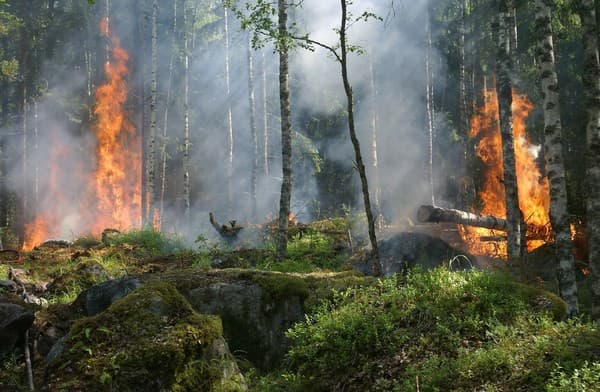
Image credits : Pixabay 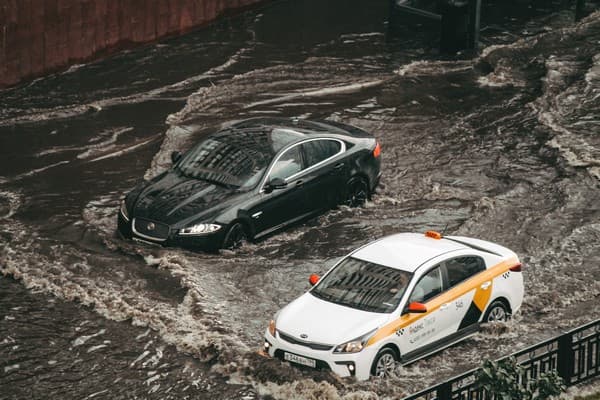
Image credits : Sveta K
These are some of the many similar headlines announcing extreme weather events that have been flashing on our TV screens, newspapers and phones over the past several months. More frequent and intense wildfires, floods, droughts, extreme temperatures, and air pollution, are now becoming increasingly evident, thanks to climate change.

For those individuals who have grown up listening to these dire predictions, to witness them coming true can induce feelings of guilt, shock, anxiety and panic. Have you experienced or are experiencing climate news-related feelings of anxiety and despair too?
Well, it is completely natural to feel so. Hearing and consuming information about the climate, observing changes in our surroundings, and sometimes even experiencing the consequences can negatively impact an individual’s well-being. There is a clear association between an individual’s state of health and the health of our surroundings and ecosystems. As some of us begin to wonder about the direct consequences of climate change, we also need to direct our attention towards the indirect effects on communities as the impact of climate change is also intertwined with different aspects of human health. But what about factors such as psychological stress which are often paid lesser attention? What is often overlooked is that the impact of climate change goes beyond physical factors. These indirect effects accumulate over time and are often subconscious in nature and difficult to process.
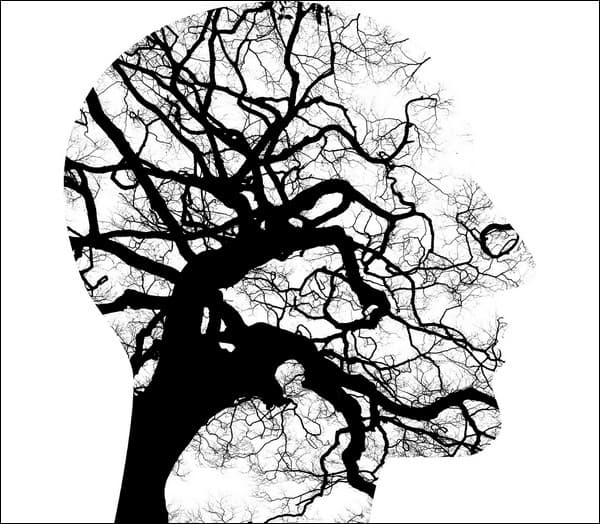
Image credits: Tumisu from Pixabay
Climate change has been acknowledged as a global threat that is going to bring about severe consequences on human health including impacts on mental health. Many people have been gripped with fear and anxiety over this, especially the youth. This distress or sense of worry has a name – ‘eco-anxiety’. Philosopher Glenn Albrecht who coined the term eco-anxiety describes it as “a chronic fear of environmental doom” while others mainly talk about eco-anxiety as anxiety experienced in response to the deteriorating ecological conditions and environmental crisis. Eco-anxiety encompasses all the emotions that some of us experience when we think about the effects of a warming world on the people, our environment, biodiversity, etc.
The consequences of this crisis can give rise to existential questions about the future and instill a sense of uncertainty and the question of if we as humans are doing enough to save the planet, while thoughts about concerns for one’s own wellbeing also develop. Worrying about future generations, one’s lifestyle and a sense of identity can be a source of stress for many people. Environmental threats and fear of future disasters can imperil an individual’s sense of attachment, identity, relationships and interactions with each other. These can lead to greater feelings of despair thereby impacting people’s mental health.
Certain groups tend to be more vulnerable to eco-anxiety such as women, especially young mothers, indigenous communities, youth, elderly people and people with disabilities. Those who have faced natural disasters and climate impacts themselves also feel a greater sense of insecurity and may live in constant fear of future calamities, socio-economic hardships, and threats to their livelihoods.
Eco-anxiety however is not a mental illness and is considered to be a rational response to the vastness of the environmental problems that we are facing, says Graham Lawton in his column. But what exactly is anxiety? Anxiety is an individual’s biological response expressed as a perception of an unknown danger or threat. Individuals experiencing anxiety can seek solutions through psychotherapy, medical advice, and exercise as these are proven to be helpful in coping with anxiety.
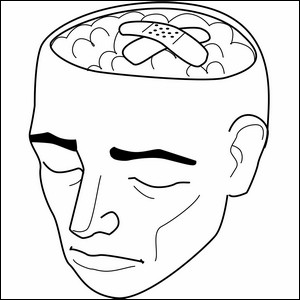
On the other hand, dealing with eco-anxiety can be tough as it can seed negative emotions like guilt, fear, powerlessness, hopelessness, anger, apathy, lack of control, and worry. This distress might be further coupled with frustration due to the lack of action by leaders, decision makers, and governments. Such a mental state can lead to two possible outcomes:
a) Individuals either become more mindful of their actions and try and contribute to the cause of climate action, or
b) Individuals may harbor hopelessness and therefore become cynical about the inevitability of doom and cease to act or in some cases even lead an environment-unfriendly lifestyle.
Both outcomes seem to be on the extreme ends of the spectrum. While making changes on an individual level appears to be one of the practical solutions, its mark on the larger issue of climate change might seem insignificant and therefore may play a role in inaction and evoke a sense of doom and gloom. However, it is never too late to make responsible choices and aspire to make changes at an individual level. Sometimes the emotion of anxiety towards the environment can spur positive efforts. It is therefore important to focus on how we feel, acknowledge and understand our emotions, and try to channel them positively.
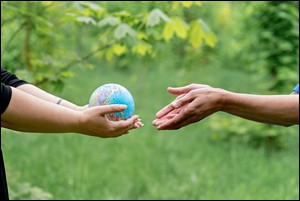
Sharing your eco-anxiety with others who feel the same way can ease the journey for you. Such interactions will create a safe space and also lead to some productive solutions to the issues one might be facing. It is important to seek support and begin to create safe spaces to talk about the varying degrees of worries about the planet. It is important for people to understand that they are not alone, and their concern is shared by many others around the world. They could also volunteer for organisations that are trying to find solutions to the climate crisis. Often times, hands-on action can breed optimism and a feeling of satisfaction that one is not choosing to be a helpless spectator.
Let’s work towards a healthier planet in hope of a healthier life on it!
References
- Badullovich, N., Haddaway, N. R., & Duggan, J. (2021, December 23). Climate anxiety is real. why talking about it matters. World Economic Forum. Retrieved June 13, 2022, from https://www.weforum.org/agenda/2021/12/climate-anxiety-mental-health/
- Clayton, S., Manning, C., Speiser, M., & Hill, A. N. (2021). Mental health and our changing climate. PsycEXTRA Dataset. https://doi.org/10.1037/e507892021-001
- Doherty, T. J., & Clayton, S. (2011). The psychological impacts of global climate change. American Psychologist, 66(4), 265–276. https://doi.org/10.1037/a0023141
- Duggan, J., Haddaway, N. R., & Badullovich, N. (2021). Climate emotions: It is ok to feel the way you do. The Lancet Planetary Health, 5(12). https://doi.org/10.1016/s2542-5196(21)00318-1
- Gifford, E., & Gifford, R. (2016). The largely unacknowledged impact of climate change on Mental Health. Bulletin of the Atomic Scientists, 72(5), 292–297. https://doi.org/10.1080/00963402.2016.1216505
- Gunasiri, H., Wang, Y., Watkins, E.-M., Capetola, T., Henderson-Wilson, C., & Patrick, R. (2022). Hope, coping and eco-anxiety: Young people’s mental health in a climate-impacted Australia. International Journal of Environmental Research and Public Health, 19(9), 5528. https://doi.org/10.3390/ijerph19095528
- Hickman, C., Marks, E., Pihkala, P., Clayton, S., Lewandowski, R. E., Mayall, E. E., Wray, B., Mellor, C., & van Susteren, L. (2021). Climate anxiety in children and young people and their beliefs about government responses to climate change: A global survey. The Lancet Planetary Health, 5(12). https://doi.org/10.1016/s2542-5196(21)00278-3
- Ojala, M., Cunsolo, A., Ogunbode, C. A., & Middleton, J. (2021). Anxiety, worry, and grief in a time of environmental and climate crisis: A narrative review. Annual Review of Environment and Resources, 46(1), 35–58. https://doi.org/10.1146/annurev-environ-012220-022716
- Pihkala, P. (2018). Eco-anxiety, tragedy, and hope: Psychological and spiritual dimensions of climate change. Zygon®, 53(2), 545–569. https://doi.org/10.1111/zygo.12407
- Thoma, M. V., Rohleder, N., & Rohner, S. L. (2021). Clinical ecopsychology: The mental health impacts and underlying pathways of the climate and environmental crisis. Frontiers in Psychiatry, 12. https://doi.org/10.3389/fpsyt.2021.675936
About the authors:
Pragya Acholia works as a Social Psychologist with the Wildlife Conservation Trust. She likes reading and writing about the relative facets of environment and well-being.
Prachi Paranjpye leads psychology research for the Wildlife Conservation Trust. Her areas of interest include exploring the intersection of identity, aspiration and the environment. A green thumb, she can be spotted tending to her plants in her free time.
Disclaimer: The authors are associated with Wildlife Conservation Trust. The views and opinions expressed in the article are their own and do not necessarily reflect the views and opinions of Wildlife Conservation Trust.
Your donations support our on-ground operations, helping us meet our conservation goals.
Related Links
- Effects of Road Network on Gaur
- The Art of Camera Trapping for Conservation
- The Impact Of One Health On Conservation
- Acknowledging our Well-wishers
- Does The Ganga Waterway Need An Environmental Clearance?
